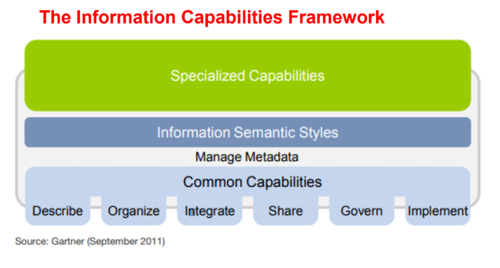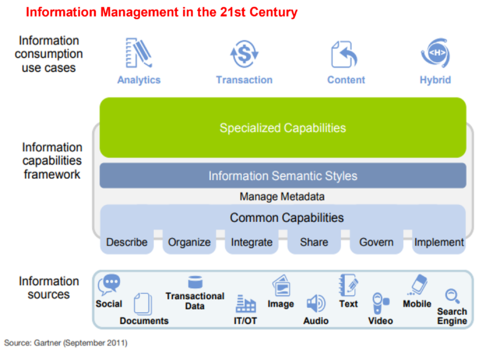Information Capabilities Framework (ICF)
Definition of Information Capabilities Framework (ICF)
Information Capabilities Framework (ICF) refers to data infrastructure and is a critical part of enterprise software. Specifically, the information capabilities framework uses technology that can be shared across other data or information platforms. This information then serves as the framework for how data can be pushed to a variety of other programs or applications.[1]
An information capabilities framework is a model that represents the technological capabilities to bring forth sound information setup in an enterprise. The infrastructure can not only account for current changes but also can cater to future needs and changes in technology services and information standards. A number of organizations devise strategies to achieve long-term information management goals, and the strategy usually consists of a correlation, independent of the application and the information source set of technologies that are free from the source and can fit into any environment. Information handling and storage are among the biggest challenges to enterprise information management (EIM).[2]
The Gartner Information Capabilities Framework (ICF) describes an approach and guidelines for architecting a modern information infrastructure. Gartner defines ICF "as the collection of capabilities required to create business value from information assets. The ICF is a conceptual model developed to help IT leaders think holistically about the capabilities that they need to create value from enterprise information assets. It does not pre-suppose a particular use case or information source and does not rely on or advocate any particular technology or architectural style.
The ICF is a conceptual framework and doesn't imply or require a specific architectural approach, implementation tactics, or tools, or technologies. It does, however, recognize that the capabilities described within are interdependent and that extreme data challenges require a more holistic approach than has been traditionally practiced. But it's not only for extreme information challenges. Any organization would benefit from this, even if they have no dimensions of "extreme." Just evolving existing capabilities in a consistent, application-independent manner has huge value. It enables the organization to treat information as a strategic asset, equal in importance to applications and business processes.
Typically, capabilities required for information management were developed independently by project, application, or information type. This approach has led to fragmented, disjointed silos of information that are not easily joined together and cannot readily support new information types and use cases. It also has generated siloed approaches to managing information — each application or project taking its own approaches to the "verbs" in the platform. This creates redundancies (higher cost), inconsistencies (higher risk and cost), complexity (lack of agility), and lack of transparency (impossible to know how the data is really being managed). To meet the new information challenges described above, a new approach is required: the information capabilities framework.[3]
What ICF Aims to Do?[4]
- Transition: "Information as a by-product" to "information as an asset"
- Alignment: Information capabilities to support the business model
- Integration: Move to a cross-application-enabling, Adaptive information infrastructure
- Inclusiveness: Ensure sources can address the entire information continuum (internal, external, Big Data, etc.)
- Leverage: The use of metadata to add value to the business model
How Not to Use ICF?[5]
- Silos: Should not lock information into individual systems, rather use ICF to evaluate the existing environment and guide the development of solutions.
- Ownership: Should not focus infrastructure on "ownership" but rather on a "capability-driven" approach
- Tunnel Vision: Should not be strictly followed but used to question whether current capabilities are appropriate instead of adding new silos
- Panacea: Should not expect vendors to deliver a complete ICF product, it's a framework to be customized according to each organization
The 21st Century Information Capabilities Framework[6]
The 21st century ICF (see Figure below) addresses three key transformations:
- Use Cases: Emerging information uses and major changes to existing information uses often represent the greatest new value to the enterprise and require information to be available across use cases rather than being locked into only one use case.
- The Information Capabilities Framework: Moving toward the deployment of the application enabling, information repositories and sources, as well as information infrastructure that handles many data types rather than infrastructure dedicated to data types.
- Information Sources: Leveraging the information continuum with a consistent approach to information management and governance of multiple types and multiple internal/external information sources, and expanding information volume, velocity, variety, and complexity.
These three transformations demand a profound modernization of current information management infrastructure and will be part of the modernization that many organizations will go through over the next five to 10 years.
Information Capabilities Framework (ICF) vs Enterprise Information Management (EIM)[7]
An information capabilities framework (ICF) is a modern information infrastructure that helps in the organization and support of various data formats. The framework uses a set of technologies and interfaces that can be shared across various platforms. The information structure is designed to support various use cases of information such as online business applications, critical applications, and similar forms of information dealing with applications and functions.
Enterprise information management (EIM) is a term that is used somewhat broadly in IT to refer to methods and strategies that use existing data well. An EIM project or resource takes information about the business and uses it effectively toward any given objective.
See Also
Gartner's Hype Cycle Methodology
Gartner's PACE Layered Application Strategy
Gartner Magic Quadrant
References
- ↑ Defining Information Capabilities Framework (ICF)[1]
- ↑ Explaining Information Capabilities Framework (ICF)[2]
- ↑ What is the Gartner Information Capabilities Framework (ICF)? [3]
- ↑ What ICF Aims to Do?[4]
- ↑ How Not to Use ICF??[5]
- ↑ The 21st century ICF [6]
- ↑ Key differences between Information Capabilities Framework (ICF) and Enterprise Information Management (EIM)?[7]


